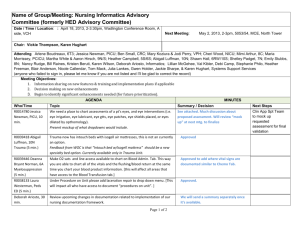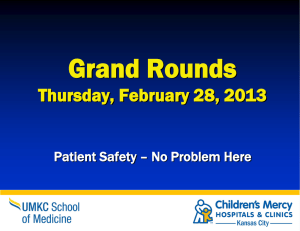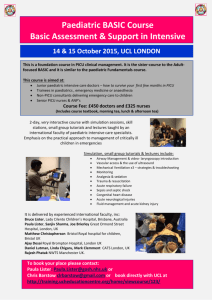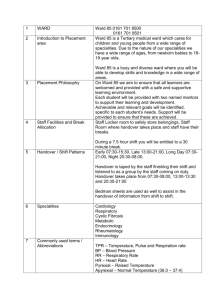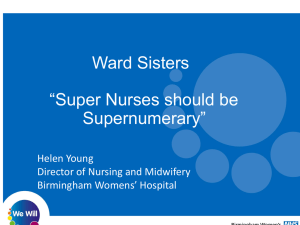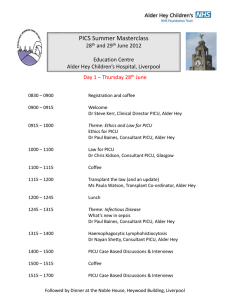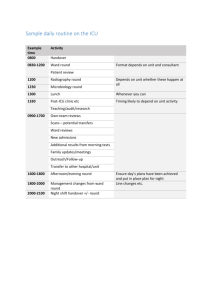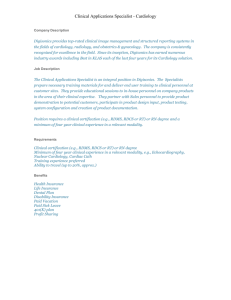View full JIG detail - London School of Paediatrics
advertisement
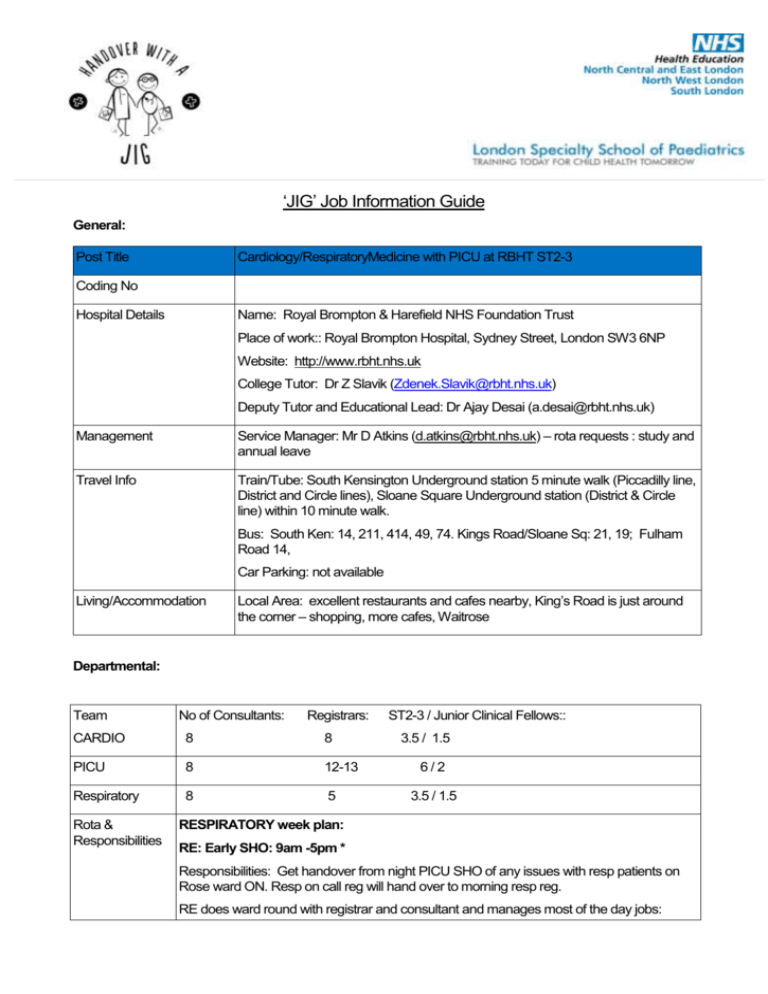
‘JIG’ Job Information Guide General: Post Title Cardiology/RespiratoryMedicine with PICU at RBHT ST2-3 Coding No Hospital Details Name: Royal Brompton & Harefield NHS Foundation Trust Place of work:: Royal Brompton Hospital, Sydney Street, London SW3 6NP Website: http://www.rbht.nhs.uk College Tutor: Dr Z Slavik (Zdenek.Slavik@rbht.nhs.uk) Deputy Tutor and Educational Lead: Dr Ajay Desai (a.desai@rbht.nhs.uk) Management Service Manager: Mr D Atkins (d.atkins@rbht.nhs.uk) – rota requests : study and annual leave Travel Info Train/Tube: South Kensington Underground station 5 minute walk (Piccadilly line, District and Circle lines), Sloane Square Underground station (District & Circle line) within 10 minute walk. Bus: South Ken: 14, 211, 414, 49, 74. Kings Road/Sloane Sq: 21, 19; Fulham Road 14, Car Parking: not available Living/Accommodation Local Area: excellent restaurants and cafes nearby, King’s Road is just around the corner – shopping, more cafes, Waitrose Departmental: Team No of Consultants: Registrars: CARDIO 8 8 PICU 8 12-13 Respiratory 8 5 Rota & Responsibilities ST2-3 / Junior Clinical Fellows:: 3.5 / 1.5 6/2 3.5 / 1.5 RESPIRATORY week plan: RE: Early SHO: 9am -5pm * Responsibilities: Get handover from night PICU SHO of any issues with resp patients on Rose ward ON. Resp on call reg will hand over to morning resp reg. RE does ward round with registrar and consultant and manages most of the day jobs: Discharge summaries, arrange investigations, request and chase bloods. On Wednesday RE SHO and reg present the ward patients to consultants at MDT Grand Round at 9:30am. Update list by 5pm for handover – evening reg will attend ward to take handover and consultant attends to catch up on day progress. RL : Late SHO: 11am-7pm RL clerks ward admission from 11am, helps with ward jobs whilst RE and reg are on WR and clerks in sleep lab patients who arrive from 4pm. RL also prepares for and attends bronchoscopy on Monday and Friday afternoons: patients arrive in morning and bronch list starts at 2pm in main theatre (need to prepare hand written forms, specimen bottles and take longline kit in ‘bronch box’. Change into scrubs in main theatre changing room. Chase lung function results for all the CF / PCD in-patients. Lung function is on done every Tuesday and Friday for all CF and PCD patients by the physiologist and results are usual brought onto ward around 5pm. File the results, go through changes with reg and put the new values on the list. RL hands over to long day PICU SHO with jobs for evening/night. Special mention for Wednesdays: this is the change over day of the attending consultant and can be quite busy: Journal club 8am in cardiology seminar room. MDT Grand Round 9:30 am (registrar and RE SHO present ward patients to consultants). Xray meeting 12:30pm attended by all. SHO teaching 1pm both RE and RL to attend, resp reg covers ward for this hour. CARIDOLOGY week plan: CE: CARDIOLOGY Early ST2-3: 9am -5pm Responsibilities: - Get handover from night PICU ST2-3 of any issues with cardiology patients on Rose ward overnight. (Cardiology on call SpR will hand over to morning cardiology SpR). - CE ST2-3 does ward round with registrar and consultant then does the ward round jobs (write a list of jobs in the jobs book as you go round) o Ensure ward phlebotomist has a list of the patients that need bloods by 12 noon (then go and find them to confirm the bloods to ensure they are done) o Put patients on the ‘echo board’ in the echo room as soon as you know they need an echo on the day – the echo technicians will do them ASAP o Get TTAs done ASAP - There will be patients coming from PICU throughout the day – handover of the patient will be SpR to SpR however sometimes the ST2-3 needs to clerk them therefore try to listen to the handover. - Update list by 5pm for handover – evening reg will attend ward to take handover and consultant attends to catch up on day progress. RL : CARDIOLOGY Late ST2-3: 11am-7pm Responsibilities: - Check the white board on the ward to see how many patients cardiology have being admitted to the ward that day (cardiology are written in red and respiratory are in blue) - Check the ‘admissions folder’ for the patient details (hospital number etc) then find their notes. You generally need to find out when they last had bloods, CXR, ECG and Echo then depending on what they are coming in for ie surgery/ catheter you will need to coordinate all of this (there are guidelines for this) - Ensure all investigations that are needed are done and checked by you, the ST2-3 you handover to or the SpR, and make sure they have been cross matched if need be (check guideliens or ask the consultant) - Clerk the patient when they arrive. Anaesthetics and Cardiology SpR/surgeon will come and consent later in the day. - Top tip: locate the nurse that will be taking the patient when they get admitted then tell them exactly what they need, if you don’t do this then the patient will be told they can leave the ward and go and have lunch/ dinner. PICU week plan : Long Day ST2-3: 09:00-21:00 - You will be allocated 3-5 patients on PICU to look after – you are the lead doctor for these patients but you will have a registrar assigned to your patients too. - Morning paper round in PICU seminar room starts 09:00. Day ST2-3 types ward round morning plan onto ICIP (electronic notes system). Night PICU ST2-3 hands over his/her patients first. Morning round is attended by charge nurse, each patient’s bed side nurse pops in for his/her patient separately. Night ST2-3 then leaves the handover as soon as they have finished handing over their patients. - Afternoon round at 2pm (take mobile ICIP computer with you reg/ST2-3 take in turns to type for each other). Present your patients to day consultant, make afternoon plan. - Evening round around 6pm, present to evening consultant (on call overnight) and make night plan. - At 7pm the late shift ST2-3 on Rose ward for both Cardiology and Respiratory will hand over the ward patients to you. - All new admissions will need bloods, CXR and ECG. The doctor always does the first ECG on any new patient. Make sure you request the bloods and the CXR (electronic system). Night SHO 21:00 – 09:00 - Covers Rose ward patients cardiology and respiratory (handed over by PICU SHO) and PICU patients as allocated. Remember that you have a respiratory and cardiology SpR on call overnight who you should run patient past if you have any problems. - The PICU patients you are allocated to are your responsibility, therefore if you find you are really busy on Rose ward (which you can get) then tell the PICU SpRs so they can help cover your PICU patients - 7:30am SURGICAL ROUND: this can be daunting. You present your patients to the surgical, PICU and cardiology team as you walk round PICU. Keep the presentation concise and factual, the details will be in the PICU handover – you’ll get the idea. - 8-9am attend teaching on Fridays (compulsory SHO teaching) - Write overnight in the blood trend folder which will be used in handover - Ensure all X-Rays are done prior to the handover in the morning (usually call XRay at about 6am) - Print off hand over list for morning handover and hand over any night issues to day resp/cardiology SHO before you handover the PICU patients - Create a list of patients with the sister in charge for the order that will be handed over (generally present the Respiratory PICU patients first followed by the SHO’s patients) - PICU handover starts at 9am. PICU night SHO leaves at 10am * CE/PICU SHO attend 8am on Fridays for PICU teaching in PICU seminar room Departmental strengths CARDIOLOGY: - Busy job - days go fast - Friendly cardiology team, approachable consultants, if in doubt just ask. - Working with excellent cardiologists and cardiothoracic surgeons – ask loads of questions and you’ll get a lot out of this job. - Opportunity to get good at reading ECGs if you take the initiative – every single patient gets an ECG and usually the SpR looks at them but take the initiative and you’ll be great at reading them by the end - Opportunity to make sense of Echos. You can see loads and can do them if you are proactive, you usually need to do them in your own time however because the job is generally very busy PICU: - Pro-teaching environment on ward and excellent formal teaching - Specialist cardiothoracic unit - Very interesting cardiac and respiratory pathology both chronic and acute for wide range of conditions - Nurses can be very helpful to guide you especially charge nurses, ANP and educational nurses. RESP: - Strong MDT : Friendly rose ward nurse, the specialist pharmacist are really helpful, and the physiotherapists work closely with medical team for CF patients. - Experience how a tertiary centre provides specialist regional care for CF and PCD patients - Clinics: General resp with new referrals and follow-up CF clinic PCD clinic Lung function - Good Wednesday morning teaching at journal club presented by registrars and consultants Training opportunities Observing procedures such as Echocardiography Cath Lab – regular sessions – Monday, Wednesday, Friday - always welcome to attend Get good at interpreting ECGs if proactive Gain a better understanding of lung function and spirometry Plenty of opportunity to do long lines on Resp in bronch list and on ward Can attend cardiothoracic surgery if your organise this –get the ok from the Surgeon Opportunity for procedures on PICU such as intubations and lines Specialist clinics available to all to attend on clinic days Complex cardiac cases on PICU and post op management Simulation ‘SPRinT’ training on PICU In house safeguarding training including level 3 available NWT PICU regional teaching and NWT paeds regional teaching programmes http://www.londonpaediatrics.co.uk/wp/wp-content/uploads/2014/01/Paediatric-NWTRegional-Teaching.pdf Teaching Top tips Excellent teaching on PICU, consultants very motivated and teach ad hoc on the ward and bedside. Registrar PICU fellows also active in teaching. Excellent formal PICU Friday morning teaching case presentation and journal review by SHO and Registrar. Wednesday afternoon SHO teaching arranged between PICU, cardiology and respiratory registrars and consultants: high quality teaching aimed at SHOs. Often PICU team arrange additional teaching on other days, also very good and extremely useful as covers PICU topics. Cardiology teaching in JCC three times per week (Monday, Tuesday and Thursdays) – the more you go to the more you will understand! Echo teaching at 1pm on Mondays Cardiac morphology teaching Tuesday afternoon Respiratory Wednesday morning journal club presenting interesting respiratory cases. Breakfast provided! RESP: Clerk in your sleep patient patients as soon as they arrive and let sleep lab nurses know you’re waiting for them otherwise get stuck quite late still clerking/waiting for patients to come back from dinner! Get up dated clinic list and plan to attend a variety of cardiology and resp clinics to get broader experience. Sit in with consultant. After you’ve clerked in bronch patients arrange their blood forms and specimen bottles as will be quick turn around in theatre. If taking longline kits with you, make sure you have plenty of spares and don’t forget your hep saline flush. Print out minimum 15 copies of hand over list for Wednesday morning grand round plus one for yourself and your reg. Always refer to CF guideline book for antibiotics doses for CF patients Cardiology Be proactive – this is a busy job but there is plenty to learn if you want to Look at all the ECGs and Echos from your patients – by the end of the job you will have learned loads Don’t ASSUME that someone else will check pre-op investigations – if you clerked them then it is your responsibility Get organised Get the discharge summaries started early - the turn over is HIGH Use the guidelines they give you (which admissions need bloods etc) – saves a lot of questions PICU: Keep a copy of ‘rough guide’ PICU handout in your pocket Presenting to cardiac surgeons on 7:30 round – make it brief! Reason for admission, underlying cardiac pathology and one line on surgical procedure +/- major complication. Current progress and condition as relevant to surgeons (ie not how you’ve tweaked fluids and supplements!). Let the morning charge nurse know the order that you’ll present patients Study leave: Cover is very difficult to obtain and mostly rely on swaps so plan your study leave early for courses. Generally SHOs on Rose ward cover each other when one is off but this can mean that one SHO is covering the ward and daycare so just make sure everyone is aware when you will be away. Trust Rep contact details: s.salehian@rbht.nhs.uk , r.poulton@rbht.nhs.uk and d.quintero@rbht.nhs.uk

